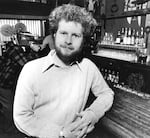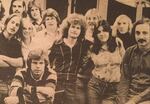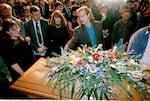
FILE - Television news reporter Randy Shilts, putting together a story on alcoholism in San Francisco's gay community, poses in one of the city's gay bars during filming for KQED-TV, March 1, 1977. Shilts was then one of the few openly gay reporters in television.
Sal Veder / AP
It was 1974, and the student-run newsroom of The Oregon Daily Emerald thought they were going to change the world.
“It was filled with a bunch of long-haired, sort of semi-counterculture journalists types that were all high on All the President’s Men and maybe other things,” said former Associate Editor Dennis Pfaff.
Former staff recall the clanking of typewriters and the reporters who stopped in at all hours of the day and night. And among them, one journalist stood apart — a curly-haired 23-year-old named Randy Shilts.
Raised in Illinois, Shilts had become involved in gay rights activism and student government in Eugene, before pivoting to journalism in his fourth year of college. His peers say he was an unusually quick learner.
At the time, eventual Emerald Editor Jim Gregory didn’t want to join a student newspaper. Then he read Shilts’ work.
“Thinking ‘my god, a student can write like that. This just blows me away,’” Gregory said. “(It was) his ability to tell a story that once you started, you could not put the paper down.”
Related: 120 years ago, ‘The Advocate’ became a voice for Black Oregonians
But something else made Shilts unique — he was openly gay, at a time when Gregory said very few on UO’s campus were out, and many still thought being gay was a choice.
Former Emerald Editor Drex Heikes said that issue came up when he hired Shilts as the paper’s managing editor that spring.
“He sat down with me, and there were some tears. He was genuinely in shock,” he said. “Because apparently, after he applied, people told him ‘they’re not going to give you that job.’”
According to Heikes, Shilts had been told the paper wouldn’t accept a gay editor. It wasn’t until years later that Heikes realized how backwards other newspapers could be.
The Award
As managing editor, Shilts was warm, witty and side-splittingly funny, according to peers. On the page, Pfaff said he could effortlessly pour out prose.
“It didn’t take long after meeting him to realize that he was brilliant,” said Pfaff. “Everybody who worked with him learned something from him. And if you didn’t, that was your fault.”
Heikes said Shilts’ writing reflected the new journalism movement, which placed more emphasis on narrative than older reporting.
“Guys could come in and use all the devices of a novelist, in terms of the way you tell the story, but you’re dealing with facts,” said Heikes, “and Randy had that down.”
Soon, Shilts’ work soon drew wider attention. Two of his articles won monthly Hearst Foundation contests — one followed a Portland drag queen, while the other documented the struggles of closeted gay professionals.
“It’s a real tear-jerker,” said Shilts, describing the second article in an Emerald interview from April 1975.
Related: New ‘Black Student Magazine’ made for Oregon, SW Washington
That led to an even larger opportunity that spring, when Shilts was selected to compete in Hearst’s national writing championships in San Francisco. The prize: $1,500 and a visit to Hearst Castle.
When Shilts won second place, Pfaff said the news spread widely. After all, Hearst was one of the largest journalistic organizations in the world.
“Everybody was so happy,” said Pfaff. “It was not only so well deserved for him, but it was a great honor for the paper, too. It made us all look good.”
But Pfaff said this made it even more humiliating when the foundation quickly pulled the award away.

Randy Shilts, center, in an Oregon Daily Emerald staff photo from 1974.
Courtesy of Daily Emerald
The Controversy
The official explanation was that there’d been a calculation error.
But Shilts’ colleagues blame something else: homophobia. They think someone was uncomfortable when Shilts took the other finalists and a judge to a gay nightclub in San Francisco.
The University of Oregon got involved in the letter-writing campaign to restore his placement, but to no success. Nearly 50 years later, the Hearst Foundation told KLCC it hasn’t kept any records that would confirm or dispute why the record was revoked.
Either way, the damage was done. Gregory said for Shilts, the rejection was personal.
“That is probably the most hurt I’ve ever seen him. He’s close to graduation. He knows he’s got to go out and get a real job, if you will,” said Gregory. “And now here’s Hearst saying, basically, ‘don’t apply here dude. Since you’re gay, you’re not worth it.’”
Pfaff recalled seeing his colleague’s cheery demeanor darken. However, he thinks the experience created something else within his colleague.
“A certain intensity in him that this wasn’t going to happen again, that he was going to fight for his career,” said Pfaff.
Related: University of Oregon students are reporting on one of track and field’s biggest events
Afterwards
When Shilts graduated in 1975, Gregory said he likely could’ve gotten a job at the Eugene Register-Guard, but Shilts was set on San Francisco.
Six years later, he’d become the first openly gay reporter to be hired by a major newspaper: the San Francisco Chronicle. Then in 1987, he published “And the Band Played On,” a bestselling book on the early response to the AIDS epidemic.
Pfaff said those same storytelling skills from the Emerald helped Shilts spotlight underreported issues.
“He was such a pioneer in bringing the story of gay America to a mainstream audience,” said Pfaff. “And he told them in a way that even people who probably thought they had no interest in the subject could be captivated.”
Although Shilts’ peers said they didn’t communicate much with him in the ensuing decades, Pfaff said they all followed his career from afar with pride. When Shilts died from complications of AIDS in 1994, they were shocked and devastated.

FILE - Mourners place flowers on Randy Shilts' casket before leaving the Glide Memorial Church in San Francisco, Feb. 22, 1994. Twelve hundred friends and family members came to pay their last respects inside the church, with over 1,500 more outside in the streets.
LACY ATKINS / AP
“We deserve to have grown old with him,” said Heikes. “We deserve to have seen what Randy was like at 70. He would have still been a hoot. He’d have been even wiser.”
Heikes said every time the other alumni get together, they tell stories about their old friend.
“The Emerald allowed us to learn and experiment with journalism at a young age,” he said. “It taught us responsibility for what we wrote, because there was nobody sitting above us with a pencil saying ‘you can’t write that.’”
In 1998, four years after his death, Randy Shilts was among the first to be inducted into UO’s School of Journalism and Communication’s Hall of Achievement.